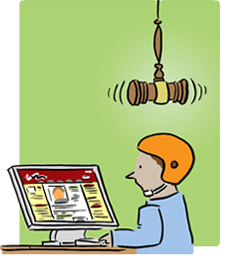Rule 8. Don’t Abuse Anonymity.
The First Amendment and the courts protect anonymous speech in the interest of fostering broad discussion among a diversity of speakers. Look back in history to the origins of anonymous pamphleteering and you’ll see precedent for the notion that in a free society, government is accountable to the people and not the other way around and therefore criticism of government must be permitted and tolerated.
The Internet allows individuals, be they consumers, advocates, adversaries, knowledgeable insiders, or distant observers, to weigh in on almost anything anonymously. That anonymity isn’t foolproof. The CEO of Whole Foods was recently unmasked in an incident involving at least two federal agencies. His anonymous posts praising his company and trashing a rival were disclosed by the Federal Trade Commission and spawned a Securities and Exchange Commission investigation of CEO John Mackey’s online financial message board postings. (See also, Rule 9).
But there is value in allowing people the freedom to speak out without fear of being recognized or held accountable by their communities for expressing unpopular views or unconventional ideas. Online anonymity encourages widespread participation. Accordingly, the Internet gives voice to a virtually infinite flow of unbridled opinions and perspectives.
In many online communities, self-policing methods, including allowing readers to post responses and ratings, can be a powerful way to correct inaccurate and even malicious postings. At the same time, though, some who believe they have been wronged by anonymous postings are filing lawsuits.
Legitimate vs. Trivial Claims
Anonymity creates a barrier against legal action. It is hard to sue someone when you can’t immediately identify him or her. But it is not impossible. Legal actions against hidden adversaries typically ask courts to order unmasking. To the extent that those unmasking requests involve frivolous claims designed to chill free speech, there is a growing body of case law strongly protecting online anonymity. However, generally speaking, the abuse of anonymity to violate the rights of others is not protected.
Partly in recognition of the value of free expression and the Internet’s unprecedented ability to foster widespread participation, Delaware’s highest court, in the case Doe v. Cahill, set a high barrier for unmasking an anonymous blog contributor in a libel lawsuit in which a town councilman claimed that comments posted to a blog had damaged his reputation. The court noted that the Internet provides those who believe they have been defamed with “a very powerful form of extra-judicial relief” in the ability to respond almost instantly to “easily correct any misstatements or falsehoods, respond to character attacks, and generally set the record straight.” Still, the court also said that “a plaintiff with a legitimate claim” as opposed to “a silly or trivial claim” should “be able to obtain the identity of an anonymous defendant and proceed” with a lawsuit. The court also said that the Internet “warrants no special protection above and beyond what traditional forms of communication receive”.
Other cases seeking to unmask online contributors have sought the identities of those believed to have posted trade secrets or violated copyrights.
Legal Protections
Those seeking to unmask anonymous contributors sometimes ask to have identities disclosed by Internet service providers. Under federal law, a cable operator can provide the identity of a subscriber to a third party under court order and with notice to the subscriber. Whether an Internet service provider must identify a subscriber is another question. In an important case against Apple Computer in California, ISPs protecting anonymous subscribers were found to have the same protections as journalists seeking to protect the anonymity of sources.
While there is a high barrier to violating anonymity, some lawyers believe that anonymous violators of others’ rights invite attempts to expose their identities. There’s also a broader legal context worth considering. Many lawyers have observed that cases with bad facts lead to bad legal precedents. Arguably, those who abuse their anonymity and free speech rights to harm others are virtually begging for case law that will make it easier to acquire the identities of anonymous posters.
The Electronic Frontier Foundation and other organizations supporting online freedom are seeking to safeguard Internet anonymity. They are working to defend anonymous bloggers and contributors against legal efforts to unmask them.
(c) Geanne Rosenberg









